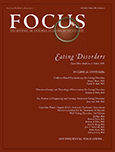Key Factors in Diagnosing and Treating Adolescent Eating Disorders
Abstract
There has been considerable progress in the clinical management of eating disorders in adolescence in the past decade. DSM-5 has been revised to be more sensitive to the clinical importance of the early presentations of eating disorders, which should lead to earlier identification, more accurate diagnoses, and more rapid intervention for this younger population. In addition, new systematic studies of treatments now support the use of a particular form of family therapy (FBT) for adolescents with anorexia nervosa. Preliminary data support the use of other forms of family therapy and in some instances individual therapy for this disorder in teenagers. The role of hospitalization has been examined and data suggest that for adolescents with anorexia nervosa, hospitalization for weight restoration is not superior to outpatient treatments in most instances. However, where access to quality outpatient care is lacking, and in some instances even where excellent outpatient care is applied, inpatient care may be necessary. There is no doubt that some patients need and benefit from inpatient weight restoration programs, but we do not yet know how best to identify for whom this costly treatment is needed. For adolescents with bulimia nervosa and binge eating disorder, systematic investigations of psychosocial treatments are few and there is no substantial evidence base supporting any specific treatment. However, preliminary studies support the clinical effectiveness of FBT, Cognitive Behavioral Therapy, Dialectical Behavior Therapy, and Interpersonal Psychotherapy for these disorders, but systematic studies are lacking. Psychopharmacologic interventions have not been proven to be systematically useful in adolescent eating disorders, but their clinical use may be indicated in refractory cases and when there is significant psychiatric comorbidity. Future advances in clinical diagnosis and treatment of eating disorders in adolescents will likely result from ongoing and novel studies of the neural underpinnings and psychological cognitive processes associated with these disorders.



